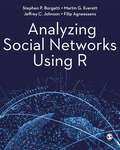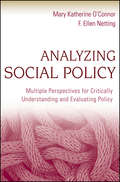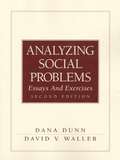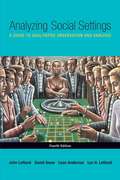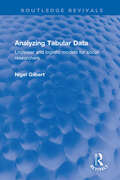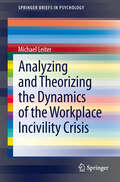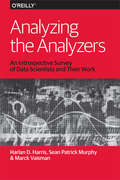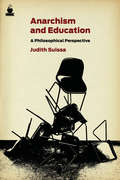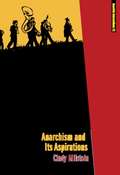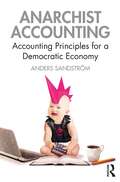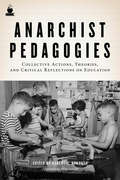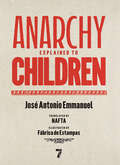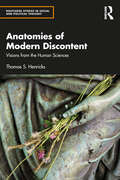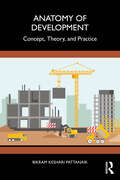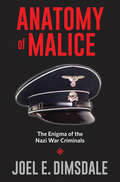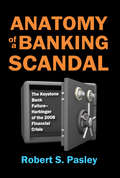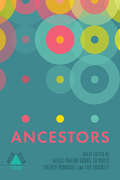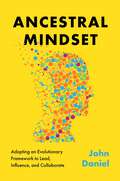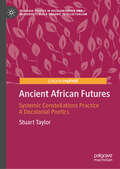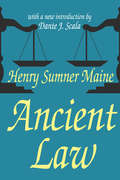- Table View
- List View
Analyzing Social Networks Using R
by Jeffrey C. Johnson Martin G. Everett Stephen P. Borgatti Filip AgneessensThis approachable book introduces network research in R, walking you through every step of doing social network analysis. Drawing together research design, data collection and data analysis, it explains the core concepts of network analysis in a non-technical way. The book balances an easy to follow explanation of the theoretical and statistical foundations underpinning network analysis with practical guidance on key steps like data management, preparation and visualisation. With clarity and expert insight, it: • Discusses measures and techniques for analyzing social network data, including digital media • Explains a range of statistical models including QAP and ERGM, giving you the tools to approach different types of networks • Offers digital resources like practice datasets and worked examples that help you get to grips with R software
Analyzing Social Policy
by F. Ellen Netting Mary Katherine O'ConnorFrom formulation to implementation, an approach to the analysis of social policy through the lens of research Analyzing Social Policy prepares professionals and students to make better informed decisions related to identifying and understanding the intricacies and potential impact of social policymaking and enactment on their organization as well as their individual responsibilities, goals, and objectives. Authors Mary Katherine O'Connor and F. Ellen Netting thoroughly examine various approaches to the analysis of social policies and how these approaches provide the knowledge, multiple perspectives, and other resources to understand and grasp the nuances of social policy in all its complexity. Comprehensive and based on research, Analyzing Social Policy explores: An overview of the practice of social policy analysis The role of research in guiding policy analysis The idea of policy analyses as research Themes, assumptions, and major theories that undergird rational models of policy analysis Nonrational themes, assumptions, and major theories informing nontraditional interpretive and critical approaches to policy analysis Strategies for applying selected models and approaches when engaging in policy analysis as research Providing practitioners and students with a set of tools that can be used to enhance an understanding of what constitutes policy as well as acceptable standards for critical analysis of policy, this resource enables policy advocates-regardless of their level-to be political, strategic, and critical in their work.
Analyzing Social Problems: Essays and Exercises (2nd edition)
by Dana S. Dunn David V. WallerThis hands-on, social problems "workbook" contains a 25 essays with accompanying exercises that address contemporary social problems and encourage critical and creative thinking about those problems. It features essays that are original, timely, and authoritative and that focus on issues that are personally relevant to today's society. The essays are written by experts in the specific areas in which they write and incorporate their own research findings and experiences into their essays and exercises. The introduction contains a sociological "tool kit" for analyzing problems in the introductory chapter along with an introduction to the various sociological approaches for addressing social problems. social institutions, social inequalities, social deviance, global social problems and social movement and change. For anyone interested in the field of social problems.
Analyzing Social Settings: A Guide to Qualitative Observation and Analysis
by John Lofland David A. Snow Leon Anderson Lyn H. LoflandThis comprehensive guide takes a 'how-to' approach to qualitative data collection and analysis. Drawing from a wealth of illustrative research examples and applications, the authors introduce techniques of collecting, focusing, and analyzing data in a step-by-step manner. First published in 1971, this book has become the field manual for any student doing social science fieldwork.
Analyzing Tabular Data: Loglinear and logistic models for social researchers (Routledge Revivals)
by Nigel GilbertFirst published in 1993, Analyzing Tabular Data is an accessible text introducing a powerful range of analytical methods. Empirical social research almost invariably requires the presentation and analysis of tables, and this book is for those who have little prior knowledge of quantitative analysis or statistics, but who have a practical need to extract the most from their data. The book begins with an introduction to the process of data analysis and the basic structure of cross-tabulations. At the core of the methods described in the text is the loglinear model. This and the logistic model, are explained and their application to causal modelling, to event history analysis, and to social mobility research are described in detail. Each chapter concludes with sample programs to show how analysis on typical datasets can be carried out using either the popular computer packages, SPSS, or the statistical programme, GLIM. The book is packed with examples which apply the methods to social science research. Sociologists, geographers, psychologists, economists, market researchers and those involved in survey research in the fields of planning, evaluation and policy will find the book to be a clear and thorough exposition of methods for the analysis of tabular data.
Analyzing and Theorizing the Dynamics of the Workplace Incivility Crisis (SpringerBriefs in Psychology #8)
by Michael LeiterContemporary worklife builds upon a foundation for teamwork among skilled and dedicated people. Despite the utility of supportive working relationships and despite extensive consulting activity on leadership and team building, employees complain extensively about mistreatment by their bosses and colleagues. Analyzing and Theorizing the Dynamics of the Workplace Incivility Crisis presents a theoretic framework for considering the fundamental issues of group dynamics and individual psychology that lie behind this ongoing workplace incivility crisis. It contextualizes the need for belonging as a motivation that shapes expressed social behaviour and intensifies received social behaviour. Looking at cognitive elements as well as rudeness rationales that pertain to workplace incivility and its justification, this work maps social constructs, including the role of team leadership, that lead to setting implicit social norms. In addition to formulating a theoretical framework, Analyzing and Theorizing the Dynamics of the Workplace Incivility Crisis considers methods to address the dynamics that perpetuate incivility at work and actively points at setting an action agenda to evaluate their impact.
Analyzing the Analyzers: An Introspective Survey of Data Scientists and Their Work
by Sean Murphy Marck Vaisman Harlan HarrisDespite the excitement around "data science," "big data," and "analytics," the ambiguity of these terms has led to poor communication between data scientists and organizations seeking their help. In this report, authors Harlan Harris, Sean Murphy, and Marck Vaisman examine their survey of several hundred data science practitioners in mid-2012, when they asked respondents how they viewed their skills, careers, and experiences with prospective employers. The results are striking.Based on the survey data, the authors found that data scientists today can be clustered into four subgroups, each with a different mix of skillsets. Their purpose is to identify a new, more precise vocabulary for data science roles, teams, and career paths.This report describes:Four data scientist clusters: Data Businesspeople, Data Creatives, Data Developers, and Data ResearchersCases in miscommunication between data scientists and organizations looking to hireWhy "T-shaped" data scientists have an advantage in breadth and depth of skillsHow organizations can apply the survey results to identify, train, integrate, team up, and promote data scientists
Anarchism and Education: A Philosophical Perspective (Routledge International Studies In The Philosophy Of Education)
by Judith SuissaArguing that the central role of educational practice in anarchist theory and activism has been overlooked by many theorists, this examination of contemporary educational philosophy counters the assertion that anarchism reflects a naïve or overly optimistic view of human nature. By articulating the philosophical underpinnings of anarchist thought on issues of human nature, freedom, authority, and social change, the case is made that the anarchist tradition can be a rich source of insights into perennial philosophical questions about education. This theoretical exploration is then bolstered with a historical account of anarchist education, focusing on key defining features of anarchist schools, their ideological underpinnings, and their pedagogical approaches. Finally, a clear explanation of how anarchist education is distinct from libertarian, progressive, Marxist, and liberal models defines the role of anarchist education in furthering and sustaining a just and equal society.
Anarchism and Education: A Philosophical Perspective (Routledge International Studies in the Philosophy of Education)
by Judith SuissaAlthough there have been a few historical accounts of the anarchist school movement, there has been no systematic work on the philosophical underpinnings of anarchist educational ideas - until now. Anarchism and Education offers a philosophical account of the neglected tradition of anarchist thought on education. Although few anarchist thinkers wrote systematically on education, this analysis is based largely on a reconstruction of the educational thought of anarchist thinkers gleaned from their various ethical, philosophical and popular writings. Primarily drawing on the work of the nineteenth century anarchist theorists such as Bakunin, Kropotkin and Proudhon, the book also covers twentieth century anarchist thinkers such as Noam Chomsky, Paul Goodman, Daniel Guerin and Colin Ward. This original work will interest philosophers of education and educationalist thinkers as well as those with a general interest in anarchism.
Anarchism and Its Aspirations
by Cindy MilsteinFrom nineteenth-century newspaper publishers to the protesters in the "Battle of Seattle" and the recent Greek uprising, anarchists have long been incited to action by the ideal of a "free society of free individuals"-a transformed world in which people and communities relate to each other intentionally and without hierarchy or domination. But what exactly would that look like, and how can we get there?Anarchism and Its Aspirations provides an accessible overview of the history and hopeful future of this vision for a better world. The book quickly brings even the uninitiated reader up to speed with a crash course on some of the most influential anarchists in history and their ideas about how we might achieve the transformation of society. From there, the book looks at how these principles have been put into practice by groups such as the Situationist International, social ecologists, Zapatistas, anti-globalization activists, and other directly democratic organizations and communities in their respective struggles against capitalism and state control.Laying out a clear introduction to some of the main ideas behind an often-misunderstood political philosophy, Anarchism and Its Aspirations helps us imagine the vast possibility of a truly free and democratic society.Cindy Milstein is an activist and educator from Vermont. She serves on the board of the Institute for Anarchist Studies, co-organizes the Renewing the Anarchist Tradition conference, and is a collective member at Black Sheep Books. Her essays have appeared in several anthologies, including Realizing the Impossible, Confronting Capitalism, and Globalize LiberationX.
Anarchist Accounting: Accounting Principles for a Democratic Economy
by Anders SandströmThis book is about accounting in an alternative libertarian socialist economic system. It explores what information and transactions we need to enable democratic and effective financial decisions by those affected by the decisions. Based on the economic model, participatory economics, the author proposes a set of accounting principles for an economy comprised of common ownership of productive resources, worker and consumer councils, and democratic planning, promoting the model’s core values. The author tackles questions such as how accounting could be organised in an economy with no private equity owners or private lenders and creditors that is not based on greed and competition but instead on cooperation and solidarity. A large part of the book is focused on issues regarding investments; thus, he asks how and on what basis decisions are made about the allocation of an economy’s production between consumption today and investments that enable more consumption in the future, and how investments are accounted for. He also considers how investments in capital assets and production facilities would be decided, financed, and valued if they are not owned by private capital owners and if allocation does not take place through markets but through a form of democratic planning. In answering these questions and more, the author demonstrates that alternative economic systems are indeed possible, and not merely lofty utopias that cannot be put into practice, and inspires further discussion about economic vision. By applying accounting to a new economic setting and offering both technical information and the author’s bold vision, this book is a comprehensive and valuable supplementary text for courses touching on critical accounting theory. It will also appeal to readers interested in alternative kinds of economies.
Anarchist Pedagogies: Collective Actions, Theories, and Critical Reflections on Education
by Allan AntliffImportant and challenging issues in the area of anarchism and education are presented in this history of egalitarian and free-school practices. From Francisco Ferrer's modern schools in Spain and the Work People's College in the United States, to contemporary actions in developing "free skools" in the United Kingdom and Canada, the contributors illustrate the importance of developing complex connections between educational theories and collective actions. Major themes in the volume include learning from historical anarchist experiments in education, ways that contemporary anarchists create dynamic and situated learning spaces, and critical reflections on theoretical frameworks and educational practices. Many trailblazing thinkers and practitioners contributed to this volume, such as Jeffery Shantz, John Jordon, Abraham de Leon, Richard Kahn, Matthew Weinstein, and Alex Khasnabish. This thoughtful and provocative collection proves that egalitarian education is possible at all ages and levels.
Anarchy Explained to Children
by José Antonio EmmanuelBoth an extraordinary 1930s text on anarchism in its original sense of liberatory principles of equality and mutual support, and short chapters with all-age-appropriate illustrations and explanations of each principle.A gorgeous package with a new intro and original engravings will appeal to progressive parents and children alike.Here is a modern book for progressive readers of all ages that includes the prescient 1931 pamphlet, "Anarchy Explained to Children," by José Antonio Emmanuel writing under the pseudonym Max Bembo, a teacher and anarchist philanthropist who advocated for, among other things, freeing the education of children from the power of the Catholic Church. In the essay he offers to the children of working-class families a simple explanation of liberatory principles and how to put them into practice.Following the essay, each of the principles he proposes is explained very simply in a double page spread accompanied by an engraving, which conveys the beauty of the world that Emmanuel envisioned. The engravings were newly created for the 2017 Argentine edition of this book.Anarchy Explained to Children will appeal to parents and educators who are interested in sharing with a young reader the ideals of liberatory education, in which extremism and oppression are banished, and values of mutual support, equality between individuals, universal love and human solidarity are promoted.&“Help: To those who hesitate, give them encouragement: to those who despair of seeing victory far away, give them courage. Mutual help is a sacred and universal duty.&”
Anatomie einer Elite – Top-Manager in Deutschland: Deutungsmuster, Prinzipien des Wirtschaftens und der Organisation (Organization, Management and Crime - Organisation, Management und Kriminalität)
by Markus Pohlmann Gert Schmidt Renate Liebold Stefan BärDas Buch beschäftigt sich empirisch mit der aus der Globalisierungstheorie stammenden These der globalen ökonomischen Elite und der damit verbundenen These der neoliberalen Konvergenz. Theoretisch knüpft das Buch an am Begriff des Geist bzw. neuen Geist des Kapitalismus, führt die Forschungsperspektive aber weiter, indem habitualisierte, kollektive Wissensbestände als dessen Konstitutionsmerkmale zu Grunde gelegt und empirisch untersucht werden. Das Buch bietet auf Basis von insbesondere im qualitativen Schritt exklusivem Material Einsichten in die „Anatomie einer Elite“. Wenn in diesem Buch von ökonomischen Eliten gesprochen wird, dann folgen die Ausführungen keinem substanziellen Elitenverständnis, sondern einem Positionsansatz. Gemeint sind damit Personen, die Spitzenpositionen in wichtigen gesellschaftlichen Bereichen, wie jenem der Ökonomie, besetzen. Weil die „Weltklasse“ der Spitzenmanager von Großunternehmen im Diskurs als die Trägerschicht einer neoliberalen Unternehmens- und Mitarbeiterführung gilt, wurden zwei Generationen von Top-Managern, welche die Spitzenpositionen in den 100 größten deutschen Industrieunternehmen besetzt haben, in den Blick genommen. Mit Hilfe von Karriereverlaufsanalysen, Interviews und auto-/biographischem Material wurden die beiden verbundenen Thesen der globalen Elite und neoliberalen Konvergenz empirisch auf den Prüfstand gestellt.
Anatomies of Modern Discontent: Visions from the Human Sciences (Routledge Studies in Social and Political Thought)
by Thomas S. HenricksThis book provides an overview and analysis of the thought of figures across the human and social sciences on the character, causes, and consequences of discontent in modern societies. Exploring the important social and cultural conditions associated with modernity, it focuses on the contributions of 38 prominent scholars from the late nineteenth and twentieth centuries – philosophers, historians, and social scientists – on the subject of discontent and social malaise, and individual and collective well-being. Thematically organized, this volume offers brief portraits of the lives and key ideas of these thinkers, leading toward a presentation of modernity as a “differentiated complaint.” Reclaiming an important tradition in the human and social sciences that sees life on a grand scale, that integrates personal affairs with social and cultural matters, and that dares people to recommit themselves to this broader vision of human involvement, Anatomies of Modern Discontent will appeal to readers across the social sciences and humanities, particularly those with interests in social theory, sociology, and philosophy.
Anatomy of Development: Concept, Theory, and Practice
by Bikram PattanaikThis book details the fundamentals of development studies by adopting a multi-disciplinary approach. It presents a balanced mix of economic, social, political, cultural and administrative premises of development and analyzes its theoretical and practical dimensions. It also provides insight into the role of the stakeholders of development in different sectors.The volume provides a holistic understanding of development, effectively demonstrating how it differs from economic growth. Beginning with development theories, paradigms and actors involved in the development process, this book goes on to explain the concepts of development administration, development governance, development planning, development management and development communication. One of the fundamental components of the book is the elucidation of Development Theories – classical, neoclassical, developmental and heterodox theories essential to the discipline of “development”.This book will be useful to undergraduate and postgraduate students, researchers, teachers of development studies, economics, sociology, political science, and public administration. It will also be useful to administrators and development administration officials of state and central governments, planners, policymakers and people working in NGOs, in addition to corporate sector functionaries dealing with corporate social responsibilities and those handling developmental issues and challenges.
Anatomy of Malice: The Enigma of the Nazi War Criminals
by Joel E. DimsdaleAn eminent psychiatrist delves into the minds of Nazi leadershipin &“a fresh look at the nature of wickedness, and at our attempts to explain it&” (Sir Simon Wessely, Royal College of Psychiatrists). When the ashes had settled after World War II and the Allies convened an international war crimes trial in Nuremberg, a psychiatrist, Douglas Kelley, and a psychologist, Gustave Gilbert, tried to fathom the psychology of the Nazi leaders, using extensive psychiatric interviews, IQ tests, and Rorschach inkblot tests. The findings were so disconcerting that portions of the data were hidden away for decades and the research became a topic for vituperative disputes. Gilbert thought that the war criminals&’ malice stemmed from depraved psychopathology. Kelley viewed them as morally flawed, ordinary men who were creatures of their environment. Who was right? Drawing on his decades of experience as a psychiatrist and the dramatic advances within psychiatry, psychology, and neuroscience since Nuremberg, Joel E. Dimsdale looks anew at the findings and examines in detail four of the war criminals, Robert Ley, Hermann Göring, Julius Streicher, and Rudolf Hess. Using increasingly precise diagnostic tools, he discovers a remarkably broad spectrum of pathology. Anatomy of Malice takes us on a complex and troubling quest to make sense of the most extreme evil. &“In this fascinating and compelling journey . . . a respected scientist who has long studied the Holocaust asks probing questions about the nature of malice. I could not put this book down.&”—Thomas N. Wise, MD, Johns Hopkins University School of Medicine &“This harrowing tale and detective story asks whether the Nazi War Criminals were fundamentally like other people, or fundamentally different.&”—T.M. Luhrmann, author of How God Becomes Real
Anatomy of a Banking Scandal: The Keystone Bank Failure-Harbinger of the 2008 Financial Crisis
by Robert PasleyIn the early 1990s, the First National Bank of Keystone in West Virginia began buying and securitizing subprime mortgages from all over the country, and quickly grew from a tiny bank with just $100 million in assets to over $1.1 billion. For three years, it was listed as the most profitable large community bank in the country. It was all a fraud. All of the securitization deals the bank entered into lost money. To hide that fact, bank insiders started cooking the books, and concealing that they were also embezzling millions of dollars from the bank. This was all hidden from the bank's attorneys and auditors, federal bank examiners, and even the board of directors of the bank. To keep the examiners at bay, the bank insiders did everything possible to avoid giving them access to documents they were entitled to see, documents they knew would sink their scheme. The head of the bank even went so far as to bury four large truckloads of documents in a ditch on her ranch.Robert S. Pasley explores the failure of the First National Bank of Keystone, the intrigue involved, and the lessons that could have been learned�and still can be learned�about how banks operate, how federal banking regulators supervise financial institutions, how agencies interact with one another, and how such failures can be avoided in the future.
Anbieten ohne Anbiedern - Selbstmarketing für Kreative: Ein psychologischer Ratgeber
by Alina GauseDieser Ratgeber hilft Menschen in kreativen Berufen bzw. mit kreativem Berufsziel, "sich selbst besser zu verkaufen". Er verspricht den Aufbau einer nachhaltigen Strategie, indem sowohl persönliche und künstlerische als auch Marketing-Aspekte berücksichtigt werden. Das Fundament bildet die Aufarbeitung der besonderen psychologischen Hürden, denen kreative Persönlichkeiten bei der Eigenwerbung gegenüber stehen. Darauf aufbauend führen praktische, individuelle Übungen hin zu einem persönlichen Leitfaden. Zahlreiche Fallbeispiele bieten zudem einen Einblick in ihre Erfahrungen ab. Sänger, Schauspieler, Szenografen, Regisseure, Autoren, Musiker und bildende Künstler dürfen sich davon ebenso angesprochen fühlen wie Köche, Designer oder andere kreative Seelen. Selbstmarketing kann Spaß machen. Und Spaß ist der einzige Treibstoff, der Kreative überzeugt. Nicht im Sinne von kurzem Kick oder leichter Unterhaltung, sondern von Erfüllung, visionärer Sinnhaftigkeit und Flow-Erlebnis. Nicht weniger als das dürfen die Leser dieses Buches erwarten.
Ancestors (Boston Review / Forum #16)
by Alexis Pauline Gumbs Ed Pavlić Ivelisse RodriguezSome of today's most imaginative writers consider what it means to be made and fashioned by others.It is rare now for people to stay where they were raised, and when we encounter one another--whether in person or, increasingly, online--it is usually in contexts that obscure if not outright hide details about our past. But even in moments of pure self-invention, we are always shaped by the past. In Ancestors, some of today's most imaginative writers consider what it means to be made and fashioned by others. Are we shaped by grandparents, family, the deep past, political forebears, inherited social and economic circumstances? Can we choose our family, or is blood always thicker? And looking forward, what will it mean to be ancestors ourselves, and how will our descendants remember us?ContributorsBennet Bergman, Sam Bett, Tyree Daye, Diamond Forde, Duana Fullwiley, José B. González, Racquel Goodison, Terrance Hayes, Day Heisinger-Nixon, Tyehimba Jess, Christina Knight, Emily Lordi, Vuyelwa Maluleke, Reginald McKnight, Cheswayo Mphanza, Achal Prabhala, Domenica Ruta, Metta Sáma, Sonia Sanchez, Izumi Suzuki, Deborah Taffa, Kyoko Uchida, Ocean Vuong, Binyavanga Wainaina, Yeoh Jo-Ann, Felicia Zamora
Ancestral House: The Black Short Story In The Americas And Europe
by Charles RowellAn anthology of 70 short stories by writers of African descent. The authors are from Europe and the Americas (about half of them from the United States), and they include Alice Walker, Hal Bennett and John Edgar Wideman.
Ancestral Mindset: Adopting an Evolutionary Framework to Lead, Influence, and Collaborate
by John DanielAncestral Mindset by thought leader and human relations expert John Daniel offers deep insight into what motivates us and drives our actions and how we can use that information to better lead, influence, and collaborate at work and home.If human evolutionary history were compressed into a single calendar year with our earliest ancestor arriving on January 1, our transition from hunter-gatherers wouldn&’t occur until the end of December. We were hunter-gatherers for well over 90 percent of our collective history. The key to understanding us is understanding the hunter-gatherer neurocircuitry that crafted our human nature. In Ancestral Mindset, John Daniel traces the development of the human brain from the birth of our species and applies his insights to teach leadership and teamwork from an evolutionary-neurological perspective. Why is your fight-or-flight instinct on a hair trigger when the boss calls you in? Why does receiving advice from a colleague induce a threat state? Why does it feel so disproportionately risky to disagree with the team? The answers to those questions lie in our collective past. As a heart-transplant recipient with decades of executive HR experience, Daniel knows a thing or two about risk, survival, and human behavior from the operating room to the board room. His unique personal story and voracious appetite for research have led to a text as potentially transformative as it is bursting with information. If you are interested in upping your leadership game, improving your relationships, or just becoming more persuasive, Ancestral Mindset will help you adapt from the brain down. Access your inner hunter-gatherer and transform your take on what motivates, elevates, and convinces. It will make you a better leader, a better employee, and a better Homo sapiens to those around you.
Ancient African Futures: Systemic Constellations Practice a Decolonial Poetics (Palgrave Studies in Decolonisation and Grassroots Black Organic Intellectualism)
by Stuart TaylorAncient African Futures provides a creative and critical account of the history and form(s) of systemic constellations practice (SCP) applying a decolonial lens, emphasizing the profound significance of Zulu epistemology on its origins. The volume opens with an autoethnographic account of the author&’s African diasporan / European identity and its bearing within the SCP profession. It offers a summary introduction to SCP as a discrete modality of Western psychotherapy, commonly accepted as the creation of Anton Hellinger, a German national. Hellinger was a Jesuit missionary priest in South Africa during the 1950-1960s. The author argues that this colonial phenomenon and Hellinger himself, are emblematic of the European Imperial project. The volume scrutinises this historic-contemporary dynamic in relation to more-than-Western indigenous epistemologies, advocating for a pluriversal reckoning, considering European colonial histories and indigenous forms of cultural resistance. Having interrogated the asymmetric dynamic exchange between Africana and Western cultures, the volume then explores a &‘speculative manifesto&’. This manifesto proposes numerous concrete actions regarding future curriculum design and faculty representation within professional SCP trainings, championing a recalibration, decentring whiteness, making SCP a profession more open to and representative of diverse global communities. Honouring their historic, cultural, colonial, postcolonial and political experiences, alongside their contemporary narratives of migration, settlement and resistance to Western neocolonialism. Ultimately, advocating for an empathetic and celebratory, Black / Global Majority Heritage-inclusive SCP practice model.
Ancient Greece: A Political, Social, And Cultural History
by Sarah B. Pomeroy Stanley M. Burstein Jennifer Tolbert Roberts Walter Donlan David W. TandyRevised and updated throughout, the third edition of Ancient Greece presents the political, social, cultural, and economic history and civilization of ancient Greece in all its complexity and variety. Written by five leading authorities on the classical world, this captivating study covers theentire period from the Bronze Age through the Hellenistic Era.
Ancient Law
by Dante J. Scala Sir Henry MaineBest known as a history of progress, Ancient Law is the enduring work of the 19th-century legal historian Henry Sumner Maine. Even those who have never read Ancient Law may find Maine's famous phrase "from status to contract" familiar. His narrative spans the ancient world, in which individuals were tightly bound by status to traditional groups, and the modern one, in which individuals are viewed as autonomous beings, free to make contracts and form associations with whomever they choose. Maine's dichotomy between status-based societies and contract-based societies is a variation on a theme that has absorbed the social sciences for a century: the distinction between Gemeinschaft (community) and Gesellschaft (society). This theme has been elaborated upon by such eminent scholars as Tonnies, Durkheim, Weber, Simmel, and Parsons. Along with many lesser scholars, they have considered what we gained and what we lost when we left behind a social world held together by communal, primordial bonds, and adopted one based upon impersonal temporary agreements among individuals. Maine wrote Ancient Law to increase knowledge about the internal mechanics of developing societies. He felt a key objective was better understanding of how law develops over time. Failure to understand temporal processes in relation to legal development, he argues, leads to the creation of false dichotomies. The most important of these is the alleged division between the ancient and the modern, which Maine described as an "imaginary barrier" at which modern scholars feel they must stop and go no further. Maine's desire to breach this barrier led him to present this complex and richly nuanced analysis of legal evolution. This book will be of interest to historians, political philosophers, and those interested in the development of law.
